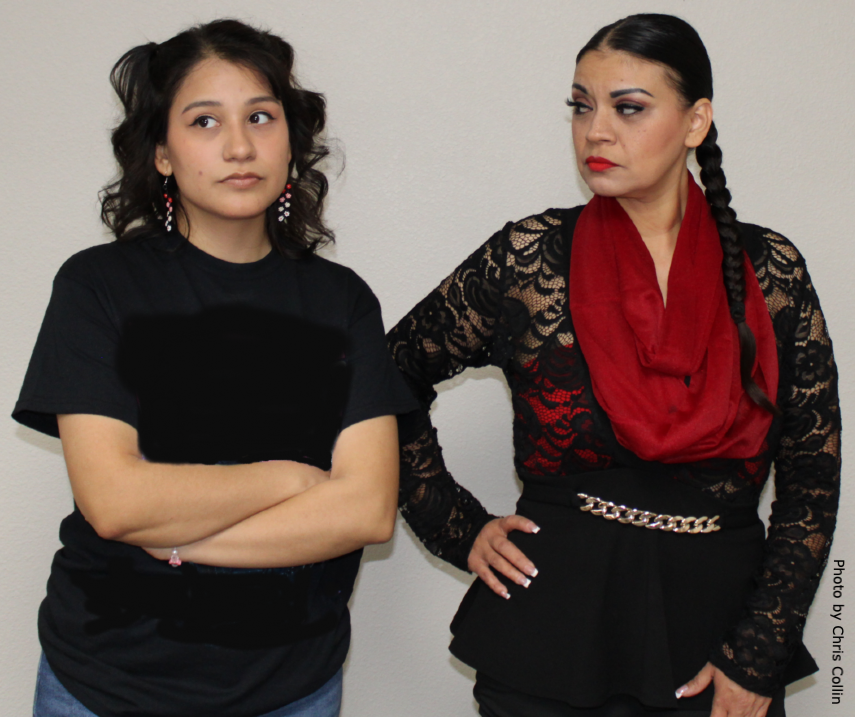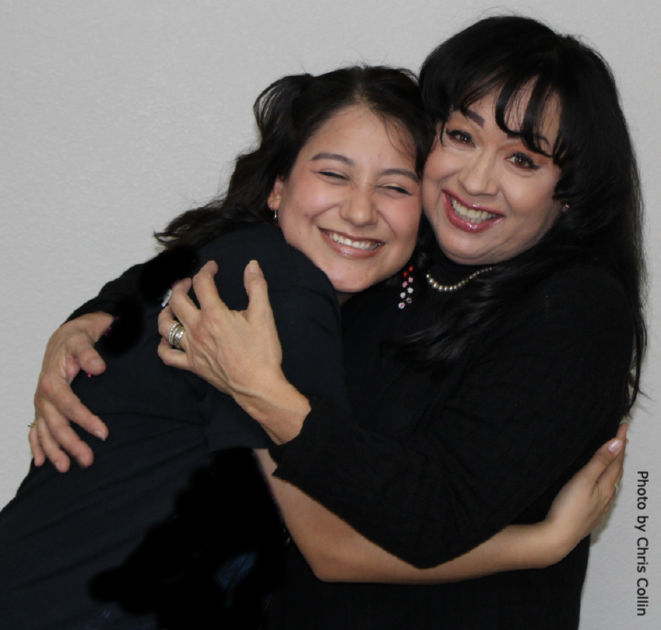Green Room’s MAGGIE MAGALITA is WELL WORTH SEEING.
by Audrey Liebross
I just saw a sweet, affecting, bilingual English and Spanish drama, Wendy Kesselman’s Maggie Magalita, presented by Green Room Theatre Coachella Valley (GRTCV). The script, although flawed, is great for adults and for kids old enough to understand about bullying and family strife. The play is excellently acted and directed, and beautifully designed, despite the set’s having to be flexible enough for performance in a gym (as when I saw it) and other non-theatrical venues (next week in a library). I have never before seen a Green Room production, but, after witnessing their achievement with Maggie Magalita, I certainly intend to see others.
The story involves an immigrant family headed by a single mother, from an unspecified country in Latin America. The titular high school girl (Melissa Luna) speaks perfect English, is a model student, and has assimilated into Anglo culture. She has also anglicized her family’s nickname for her, Magalita, into Maggie. Her mother, Elena (Rebecca Luna), meanwhile, works all day and studies at night in an effort to improve the family’s lot.
Into the mix comes Elena’s mother, who, after backing out numerous times at the last minute from plans to fly north from her country, has finally agreed to visit — perhaps to move in — with her daughter and granddaughter in the United States. She insists on calling her granddaughter “Magalita” — not Maggie — and on cooking traditional foods, the ingredient list of at least one of which is indeed cringeworthy to Yankee palates. Abuelita’s (“little grandmother”) refusal to immerse herself in the English language and in US culture exasperates her granddaughter. We learn that Maggie’s desire to escape her roots grew out of unmerciful teasing about her accent by other girls when she first arrived in the United States. Maggie just wants to fit in.
The four-person cast is made up entirely of Latinx performers, although one of the characters, Eric (Maggie’s boyfriend, played disarmingly by Christopher Lopez), is white. The acting by all four cast members is fabulous, as is David Catanzarite’s direction. It is the actors’ tone of voice, body language, and facial expressions that tells us what they are thinking and feeling — not only the script. Melissa Luna, although she is actually older, successfully portrays the duality of a high school student who is exceptionally mature in some ways but who retains a childlike concern about what racist bullies think of her. Rebecca Luna, as Elena, is sweet most of the time, managing to maintain her equanimity during most of her daughter’s insistent demands that everyone in the household speak English. Norma Marcus, as Abuelita, successfully conveys both her happiness about being with her daughter and granddaughter and her loneliness and fear about being a fish out of water, without ever saying a full paragraph in English. Although my own Ashkenazic immigrant grandmother spoke English and was comfortable in the United States, I still saw her in Abuelita. I, too, was at one time unhappy in my Jewish culture, and I wish that I could tell my grandparents how immersed I have become in my — their — roots.
Maggie Magalita was written in 1980; according to the Washington Post review of its run at the Kennedy Center, it won the 1980 National Children's Arts Festival prize for best children's play. The play takes place in a studio apartment in present day Chicago, although playwright Wendy Kesselman originally set it in New York. In my opinion, the 44-year-old script either needs to be either updated or set when it was written. For one thing, it seems unlikely that a Latina immigrant child even in Chicago, let alone the original New York City location, would experience unaddressed bullying by her classmates today without other Latinx kids around to support her. Also, a similar play taking place today would probably address deportation fears because some family members or neighbors may well be undocumented.
I also believe that the play would have been more uplifting had it ended following the rapprochement between Abuelita and Magalita. Without giving too much away, Kesselman’s decision to end the play several emotional scenes later is obviously an artistic choice, and not a flaw. Nevertheless, I would have preferred the play to end with the characters enjoying each other’s company at the lake for reasons that become obvious to anyone who attends the play.
Left Photo: Maggie (Melissa Luna) and her mother (Rebecca Luna) in an argument. Right Photo: Magalita and Abuelita (Norma Marcus).
The bilingual play is constructed to allow speakers of either language to follow the story, even if they miss a few lines here and there. The Spanish dialogue allows outreach to communities in locations such as the Eastern Coachella Valley, whose many immigrants have often not had the opportunity to attend theatre. Seeing people onstage who speak their native language hopefully allows these Valley residents to connect with theatre and to realize that, even in an English-speaking country, they can enjoy theatre.
This production is well worth seeing for the play’s timeless aspects (bullying, prejudice, desire to fit in versus keeping one’s own heritage, family strife, and getting ahead in tough economic conditions) and for the fabulous acting and directing. Exhaustion is built into the family’s way of life, climbing five flights of stairs each time to go home, and Elena’s attending school after work. Those Americans who believe that immigrants are a drain on the economy might be inspired to reconsider when they see what Magalita and her mother must endure to advance in the United States. It is impossible for all but the most prejudiced not to root for them to achieve success.
Maggie Magalita will play for three more performances, at the City of Coachella library, 1500 Sixth Street, Coachella, CA 92236 in the community room, on Friday, March 29 at 6 p.m., and on Saturday, March 30 at 1 p.m. and 6 p.m. Tickets are available on the Web site, grtccv.org, ranging in price from five to eighteen dollars. Green Room can be contacted at info@grtccv.org, (442)215-7039, or at PO Box 40, Coachella, CA 92236. The office location is 1515 6th Street, Coachella, CA 92236.
Green Room’s final production of the season is Section 14, to be presented on various dates in May and June. This innovative theatre event will address the many complex layers in the history of Section 14, a one-square-mile tract in downtown Palm Springs, where homes of Latino, Black, and other families were bulldozed and burned to make way for development.
Photos by CHRIS COLLIN



